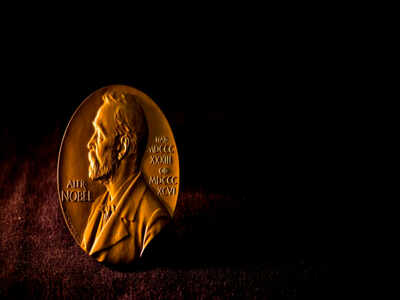
NEW DELHI: We annually read about the Nobel Prizes being conferred to people with exceptional feats. Just a day before, US President Donald Trump was nominated for the 2021 Nobel Peace Prize for brokering peace between Israel and the United Arab Emirates.
While most people know that Nobel Prize is the most prestigious award in the world but have you ever wondered why or who thought of rewarding literature, physics, chemistry, medicine and peace with an award? Here is the fascinating, rather poetic story of what motivated Alfred Nobel, the man who invented dynamite, to establish the Nobel Prizes.
Who was Alfred Nobel
Alfred Bernhard Nobel was born in Stockholm, Sweden on October 21, 1833. Alfred was born in a family of inventors and researchers. Through his father, Immanuel Nobel, Alfred was a descendant of the Swedish scientist Olaus Rudbeck, who was one of the pioneers in the study of lymphatic vessels.
Alfred's father, Immanuel, was an alumnus of Royal Institute of Technology in Stockholm and had invented the veneer lathe (which allowed the production of modern plywood) while also began the work on a torpedo.
Growing up around his father's work on machines and mechanical tools, Alfred cut his teeth with engineering early on with a keen interest in explosives.
In 1850 Alfred started working with Ascanio Sobrero, the Italian chemist who invented 'nitroglycerin' which was the first ever high explosive invented after the gunpowder. However, the problem with nitroglycerin was its unpredictability, exploding when subjected to heat or pressure. Alfred Nobel was soon about to change that.
But in his pursuance of making nitroglycerin a commercially usable explosive, Alfred ended up losing his younger brother Emil in a blast that took place in his workshop while conducting experiments.
Notwithstanding several other minor accidents and the loss of his brother, Alfred continued his research and finally in 1867, Alfred invented dynamite.
How dynamite changed the world
Dynamite was a lot more easier and safer to handle than the more unstable nitroglycerin. Patented in the US and the UK, Alfred first marketed the new product, which came in sticks wrapped in a heavy paper, as "Nobel’s Safety Blasting Powder" but later changed the name to dynamite, after the Ancient Greek word for power.
Dynamite changed the world of engineering as it was a stabilized substance that could be transported anywhere in the world safely and could move huge portions of Earth in a single blast.
Enabling mining, dynamite helped humans discover the Earth below and use its rocks, ore, minerals and metals to construct dams, buildings, machineries etc.
In 1875 Nobel also invented gelignite, more stable and powerful than dynamite, and in 1887 patented ballistite, a predecessor of cordite.
Why Alfred established Nobel Prize
Alfred, who identified himself as a pacifist, is said to have not intended dynamite to be used against humans.
Nonetheless, dynamite was first used as a weapon during the Franco-Prussian War of 1870. Between 1881 and 1885, Irish Republicans planted dynamite bombs at government and military targets in Great Britain, injuring more than 80 people with over two dozen devices.
The American military improvised and developed their own weapons based on Nobel’s invention. The first dynamite guns, Zalinski guns, could launch an explosive projectile up to 5,000 yards and were used as coastal defense in San Francisco and New York. Sims-Dudley guns, a smaller dynamite-shooting weapon was also used by the US Army during the siege of Santiago.
In the backdrop of dynamite casualties in these conflicts, news of Alfred Nobel's death arrived. However, it was not Alfred but his elder brother Ludvig who had passed away. A French newspaper mistakenly ran an obituary for Alfred with the headline "The Merchant of Death is Dead". The obituary appalled Alfred who was hit with the realisation of what his legacy would be.
Not wanting to be remembered as "the merchant of death", Alfred bequeathed his fortune to institute the Nobel Prize.
By the time he died in 1896, Alfred held 355 different patents and owned nearly 100 explosives and munitions factories which helped him and his family amass a massive fortune.
In his will signed in 1895, Alfred donated his wealth to establish an institution which would support and reward contributions made in chemistry, physics, physiology or medicine, and literature by those who have "done the most or the best work for fraternity between nations, for the abolition or reduction of standing armies and for the holding and promotion of peace congresses".
As per Alfred Nobel's will, the recipient of Nobel Prizes is selected by the Norwegian Nobel Committee, a five-member committee appointed by the Parliament of Norway. The first Nobel Prizes were awarded in December 1901.
While most people know that Nobel Prize is the most prestigious award in the world but have you ever wondered why or who thought of rewarding literature, physics, chemistry, medicine and peace with an award? Here is the fascinating, rather poetic story of what motivated Alfred Nobel, the man who invented dynamite, to establish the Nobel Prizes.
Who was Alfred Nobel
Alfred Bernhard Nobel was born in Stockholm, Sweden on October 21, 1833. Alfred was born in a family of inventors and researchers. Through his father, Immanuel Nobel, Alfred was a descendant of the Swedish scientist Olaus Rudbeck, who was one of the pioneers in the study of lymphatic vessels.
Alfred's father, Immanuel, was an alumnus of Royal Institute of Technology in Stockholm and had invented the veneer lathe (which allowed the production of modern plywood) while also began the work on a torpedo.
Growing up around his father's work on machines and mechanical tools, Alfred cut his teeth with engineering early on with a keen interest in explosives.
In 1850 Alfred started working with Ascanio Sobrero, the Italian chemist who invented 'nitroglycerin' which was the first ever high explosive invented after the gunpowder. However, the problem with nitroglycerin was its unpredictability, exploding when subjected to heat or pressure. Alfred Nobel was soon about to change that.
But in his pursuance of making nitroglycerin a commercially usable explosive, Alfred ended up losing his younger brother Emil in a blast that took place in his workshop while conducting experiments.
Notwithstanding several other minor accidents and the loss of his brother, Alfred continued his research and finally in 1867, Alfred invented dynamite.
How dynamite changed the world
Dynamite was a lot more easier and safer to handle than the more unstable nitroglycerin. Patented in the US and the UK, Alfred first marketed the new product, which came in sticks wrapped in a heavy paper, as "Nobel’s Safety Blasting Powder" but later changed the name to dynamite, after the Ancient Greek word for power.
Dynamite changed the world of engineering as it was a stabilized substance that could be transported anywhere in the world safely and could move huge portions of Earth in a single blast.
Enabling mining, dynamite helped humans discover the Earth below and use its rocks, ore, minerals and metals to construct dams, buildings, machineries etc.
In 1875 Nobel also invented gelignite, more stable and powerful than dynamite, and in 1887 patented ballistite, a predecessor of cordite.
Why Alfred established Nobel Prize
Alfred, who identified himself as a pacifist, is said to have not intended dynamite to be used against humans.
Nonetheless, dynamite was first used as a weapon during the Franco-Prussian War of 1870. Between 1881 and 1885, Irish Republicans planted dynamite bombs at government and military targets in Great Britain, injuring more than 80 people with over two dozen devices.
The American military improvised and developed their own weapons based on Nobel’s invention. The first dynamite guns, Zalinski guns, could launch an explosive projectile up to 5,000 yards and were used as coastal defense in San Francisco and New York. Sims-Dudley guns, a smaller dynamite-shooting weapon was also used by the US Army during the siege of Santiago.
In the backdrop of dynamite casualties in these conflicts, news of Alfred Nobel's death arrived. However, it was not Alfred but his elder brother Ludvig who had passed away. A French newspaper mistakenly ran an obituary for Alfred with the headline "The Merchant of Death is Dead". The obituary appalled Alfred who was hit with the realisation of what his legacy would be.
Not wanting to be remembered as "the merchant of death", Alfred bequeathed his fortune to institute the Nobel Prize.
By the time he died in 1896, Alfred held 355 different patents and owned nearly 100 explosives and munitions factories which helped him and his family amass a massive fortune.
In his will signed in 1895, Alfred donated his wealth to establish an institution which would support and reward contributions made in chemistry, physics, physiology or medicine, and literature by those who have "done the most or the best work for fraternity between nations, for the abolition or reduction of standing armies and for the holding and promotion of peace congresses".
As per Alfred Nobel's will, the recipient of Nobel Prizes is selected by the Norwegian Nobel Committee, a five-member committee appointed by the Parliament of Norway. The first Nobel Prizes were awarded in December 1901.
Download
The Times of India News App for Latest World News

Coronavirus outbreak
Trending Topics
LATEST VIDEOS
More from TOI
Navbharat Times
Featured Today in Travel
Get the app









